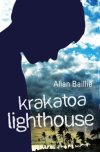Krakatoa Lighthouse by Allan Baillie

Puffin Books, 2009. ISBN 9780143303596
(Ages 10+) The son of the lighthouse keeper, Kerta is aware as is all
the village
of the islands nearby where the volcano, Krakatoa, looms over the
landscape. Kerta is friendly with everyone and when the telegraph
master offers him the job of taking the telegrams to the people living
in the town of Anjer, he readily accepts. He sees Hassan steal the
gunpowder, and sees Hassan's father chained up by the Dutch. He sees
the ships in the bay, particularly the Dutch vessels with a load of
tourists going to climb the mountain. And he is immensely proud of his
father's work keeping the lighthouse operating.
Asked to join one of the ships, he accepts reluctantly, because he is
aware that the dark spirit, Orang Aljeh is waiting. His climb up the
side of Krakatoa is fraught with danger as the mountain rumbles,
blowing pumice and ash over all the tourists and his party must run for
their lives back to their ship. The year is 1883, and Kerta and his
family live within the sights and sound of the mountain that
spectacularly exploded, leaving ash in sunsets around the world for
years after.
Baillie thrillingly tells the story of the Krakatoa eruption through
the eyes of this young Indonesian boy. Through him we see the fear
begin to spread as the ash and clouds of steam and pumice become bigger
through the month of August. When the massive explosion occurs, we are
with him clinging to life in a palm tree, as the three tsunamis roll
across his village, taking all with them. Baillie invites the reader to
feel the dread of this most famous of volcanic eruptions, as Kerta
survives the blast. Baillie is able to put his readers in the mind of
his characters enabling them to empathise with events far away in both
time and place. And along the way we have hints of colonial rule,
suggestions of the development of opposition to colonial rule, village
life, the working of steam boats in the Indonesian waters, and an
amazing array of detail about Krakotoa itself. A wonderful story for
upper primary people.
Fran Knight